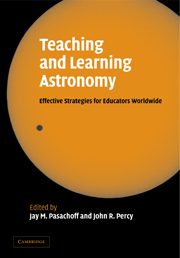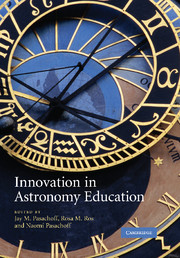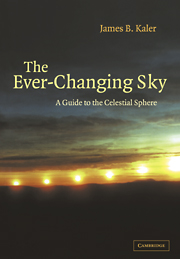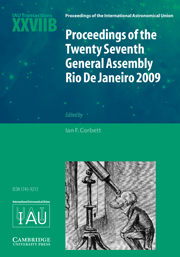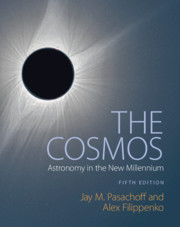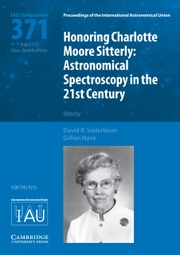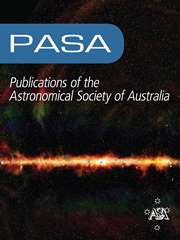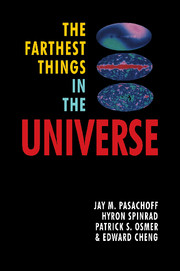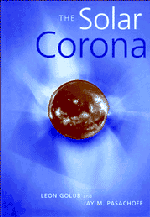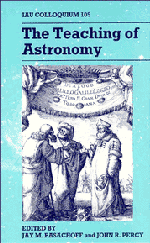Teaching and Learning Astronomy
Based on papers and posters presented by experts at a Special Session of the International Astronomical Union, this volume highlights the many places for astronomy in the curriculum. It covers relevant education research and "best practice"; strategies for pre-service and in-service teacher education; the use of the Internet and other technologies; and the role that planetariums, observatories, science centers, and organizations can play. It concludes by addressing how the teaching and learning of astronomy can be improved worldwide.
- International in scope - relevant to teaching in all countries
- Introduces relevant tools and methods for teaching
- Addresses elementary and secondary school teaching as well as outreach and communication
Reviews & endorsements
Articles present strategies and resources for reforming national science curricula and teacher training as well as for working with primary, secondary, and college students in both developing and developed nations. Helpful ideas for anyone currently teaching, planning to teach, or interested in promoting astronomy in the science curriculum.
Choice
"This is not a book for light reading or glossy pictures but an in-depth, well argued and persuasive text."
Astronomy Now
"What makes this book special is the care that has gone into articulating why astronomy education is important and why it is necessary to better train and support preservice and in-service science teachers. This book is a must-have for anyone working to add astronomy to any curriculum or to persuade funders to invest in science education. Teaching and Learning Astronomy is a conference proceeding that effectively combines articles on personal experiences in the classroom, massive multi-institute studies, and persuasive rhetoric. It is a book that will give the experienced astronomy educator some novel activities, new resource lists, and well-argued reasons to introduce astronomy to as many minds as possible."
Astronomy Educational Review
"The papers present highly interesting accounts of work in progress or critical reviews of past efforts and form a valuable resource for astronomical education. The sectional editorials are full of wisdom and good sense. [The editors and contributors have] provided a service for all who are working to promote and improve astronomical education." - D. McNally, The Observatory
Product details
July 2009Paperback
9780521115391
284 pages
244 × 170 × 15 mm
0.45kg
69 b/w illus.
Available
Table of Contents
- Preface
- Part I. Astronomy in the Curriculum Around the World: Preface
- 1. Why astronomy is useful and should be included in the school curriculum John R. Percy
- 2. Astronomy and mathematics education Rosa M. Ros
- 3. Astronomy in the curriculum around the world
- 4. Engaging gifted science students through astronomy Robert Hollow
- 5. Poster highlights: astronomy in the curriculum around the world
- Part II. Astronomy Education Research: Preface
- 6. Astronomy education research down under John M. Broadfoot and Ian S. Ginns
- 7. A contemporary review of K-16 astronomy education research Janelle M. Bailey and Timothy F. Slater
- 8. Implementing astronomy education research Leonarda Fucili
- 9. The Astronomy Education Review: report on a new journal Sidney C. Wolff and Andrew Fraknoi
- 10. Poster highlights: astronomy education research
- Part III. Educating Students: Preface
- 11. Textbooks for K-12 astronomy Jay M. Pasachoff
- 12. Distance/internet astronomy education David H. McKinnon
- 13. Educating students with robotic telescopes - open discussion
- 14. Poster highlights - educating students
- Part IV. Educating teachers: Preface
- 15. Pre-service astronomy education of teachers Mary Kay Hemenway
- 16. In-service education of teachers Michèle Gerbaldi
- 17. Poster highlights: educating teachers
- Part V. Astronomy and Pseudoscience: Preface
- 18. Astronomy, pseudoscience and rational thinking Jayant V. Narlikar
- 19. Astronomical pseudosciences in North America John R. Percy and Jay M. Pasachoff
- Part VI. Astronomy and Culture: Preface
- 20. Teaching astronomy in other cultures: archeoastronomy Julieta Fierro
- 21. Poster highlights: astronomy and culture
- Part VII. Astronomy in Developing Countries: Preface
- 22. Astronomy Curriculum for developing countries Case Rijsdijk
- 23. Science education resources for the developing countries James C. White II
- Part VIII. Public Outreach in Astronomy: Preface
- 24. What makes informal education programs successful? Nahide Craig and Isabel Hawkins
- 25. The role of science centers and planetariums Nick Lomb
- 26. Science education for the new century - a European perspective Claus Madsen
- 27. Communicating astronomy to the public Charles Blue
- 28. Poster highlights: public outreach in astronomy
- Part IX. The Education Programs of the IAU: Preface
- 29. A short overview of astronomical education carried out by the IAU Syuzo Isobe
- Part X. Discussion
- Index.

